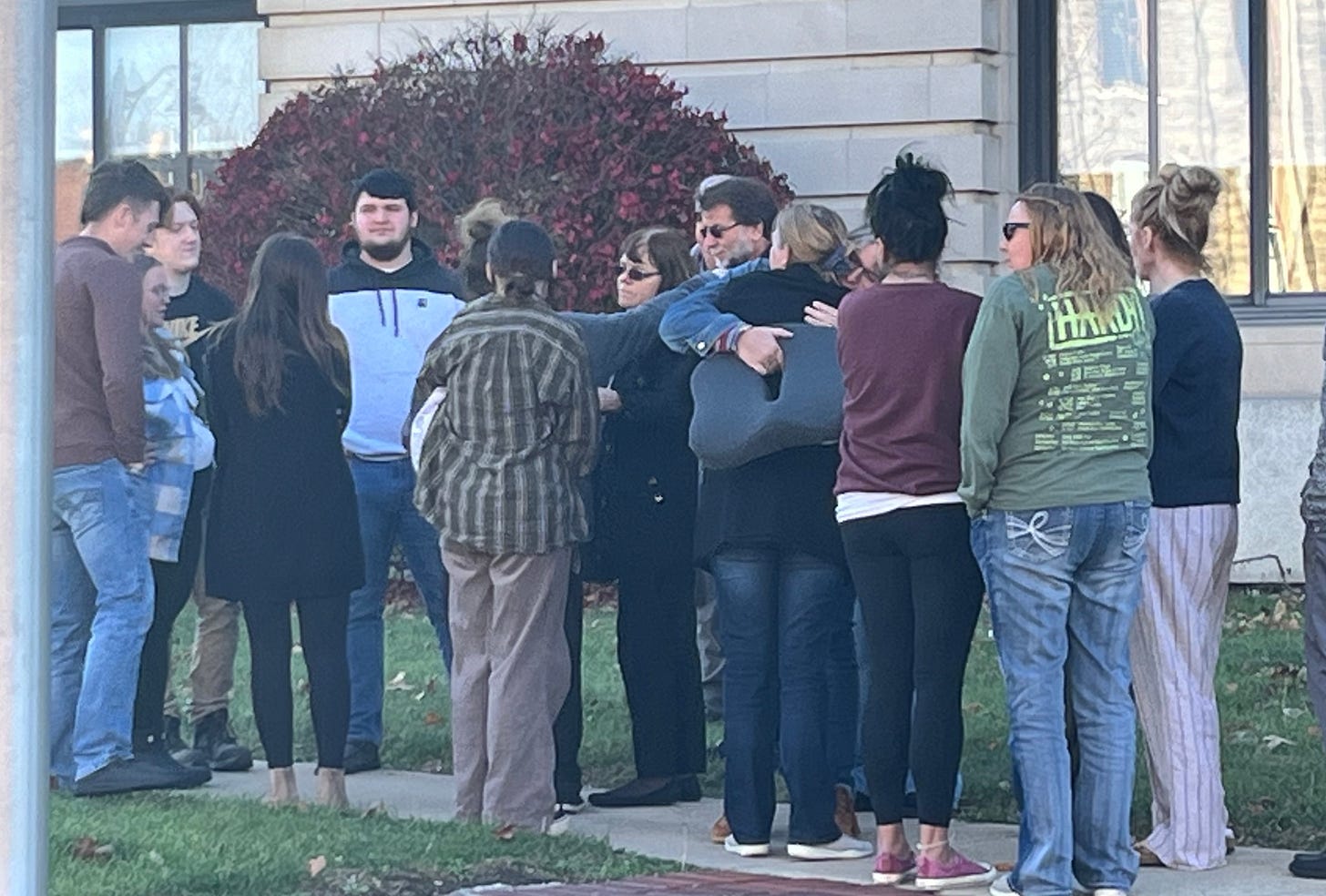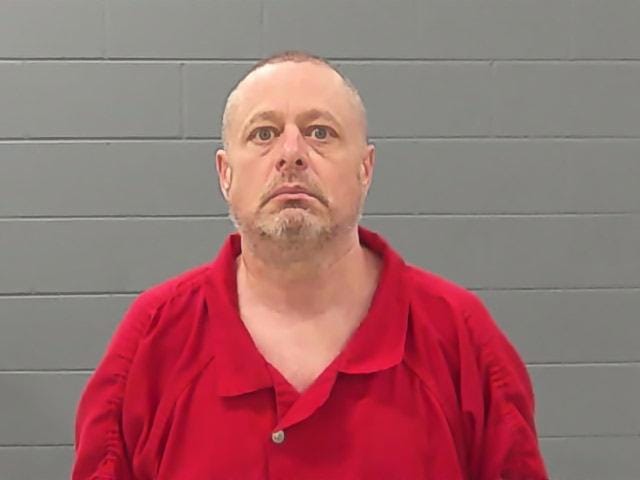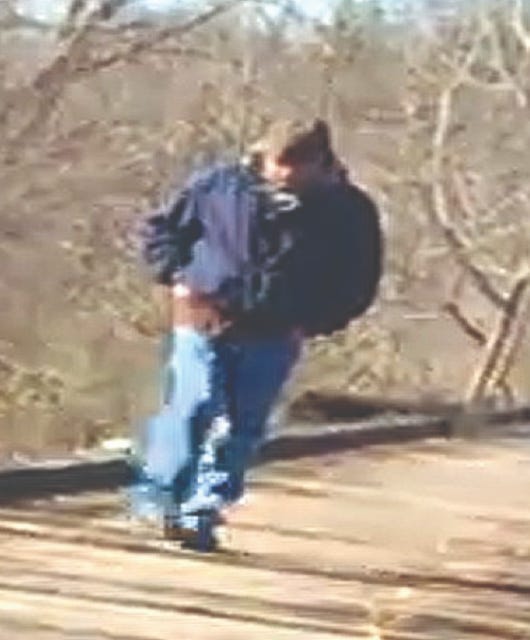Richard Allen guilty in Delphi murders of Abby and Libby
The verdict came Monday after 18 days of testimony, 19 hours of jury deliberations over four days – and 7½ years after Abby Williams and Libby German were murdered near the Monon High Bridge
As the families of Libby German and Abby Williams crossed Main Street in downtown Delphi, minutes after a jury returned four guilty verdicts Monday against Richard Allen in the girls’ 2017 murders near the town’s Monon High Bridge Trail, a driver in the pickup slowed in the Monday afternoon traffic and lightly tapped on the horn and leaned over from the driver’s seat.
“Today’s the day,” came the greeting, echoing the daily messages Becky Patty, Libby German’s grandma, posted on social media during a drawn out search for a killer of the two Delphi Community Middle School eighth-graders.
The jury selected from a pool of residents from Allen County, 90 miles away from Delphi, deliberated 19 hours over four days and returned verdicts of murder and felony murder in each of the girls’ deaths.
Allen, 52, a former pharmacy tech in Delphi, barely reacted as Judge Fran Gull read the verdicts in a packed Carroll Circuit Court, around 2:20 p.m. Monday, according to pool media accounts from the courtroom. Minutes earlier, defense attorney Andrew Baldwin had given Allen a reassuring arm around the shoulder, as he’d done during key portions of the trial.
A hushed gasp went up in an otherwise silent courtroom from some of Abby and Libby’s families, who had sat through 18 days of testimony in a case that opened Oct. 18.
Allen, handcuffed and led from the courtroom at 2:27 p.m., turned to his wife, Kathy, and mouthed the words, “Are you OK?,” according to reporters in the courtroom. Kathy Allen, who was in the courtroom throughout the trial, could barely stand as the jury left the courtroom, according to pool media reports.
Gull set sentencing for Dec. 20. The sentence for murder is between 45 and 65 years. He could face 90 to 130 years for the girls’ murders.
“This has been a long haul for both the defense and state and their teams,” Gull said before the verdict was read, warning about outbursts in the courtroom, according to pool media reports. “Regardless of whatever the verdict is, someone, someone will not be happy. Take your unhappiness outside.”
In the courtroom, per reporters inside, Becky Patty embraced Anna Williams, Abby’s mother. Indiana State Police Superintendent Doug Carter hugged Carroll County Prosecutor Nick McLeland. Outside the courthouse, families of Abby and Libby lingered a few minutes, sharing smiles and hugs. Allen’s family left with his attorneys, Baldwin and Brad Rozzi.
Defense, prosecutor, investigators and witnesses remained under a gag order, initially issued in December 2022, after Monday’s verdicts, preventing them from commenting, Capt. Ron Galaviz, chief public information officer for the Indiana State Police, said.
That included whether Rozzi and Baldwin intended to follow through on hints leading up to the trial – and even during it – that a conviction meant an appeal was imminent.

On sidewalks outside the courthouse, where dozens of people had taken up vigil for days waiting for the verdict and hoping to get a seat inside, cheers erupted as people emerged from the courthouse with word of the verdict. There were catcalls, too, from those who had been advocating for Allen, saying the wrong man was on trial.
“This has been so consuming,” Janet Cavanaugh, who lives south of Delphi in Tippecanoe County, said after the verdict. “It’s like a weight is gone. … Justice for Abby and Libby. Finally.
Away from that scene, word of the verdict spread quickly in Delphi, a community of 2,900 people 20 miles northeast of Lafayette.
Storefronts on the courthouse square were painted with Abby and Libby’s names. Light posts around the courthouse were tied with ribbons in purple and teal, the girls’ favorite colors.
“I have to say I am relieved,” Anita Werling, former mayor of Delphi, said Monday afternoon. “Of course the sentencing hearing, sentencing and appeals are yet to come, but this is a major step toward closure.”
Allen was arrested in October 2022, 5½ years after the murders, tied to the scene by his self-reported information to investigators in the days after the murders in 2017 that he’d been on the Monon High Bridge Trail the day they went missing. Investigators also pointed to an unspent Winchester .40-caliber Smith and Wesson cartridge found near the girls’ bodies.
During interviews with investigators before his arrest – shown during the trial – Allen denied any involvement in the crime, telling police he felt he was being set up as a fall guy and that they’d already ruined his life by dragging him into an accusation that connected him as a possible suspect in a case that had consumed the community for years.
The prosecution’s case revolved on a timeline that put Allen on the trail on Feb. 13, 2017, the bullet and confessions Allen made to prison officials and in recorded phone calls while he was being held for trial.
McLeland’s prosecution over the first two weeks of testimony was essentially a chronological account, starting with Abby Williams and Libby German waking up from a sleepover and pestering Libby’s family members to go to the Monon High Bridge Trail during day off from school Feb. 13, 2017. After getting a ride from Kelsi German Siebert, Libby’s sister, to a trailhead off County Road 300 North around 1:48 p.m., the girls didn’t return to meet a ride home they’d arranged with Derrick German, Libby’s dad, around 3 p.m.
A community search stretched until 2 a.m. Feb. 14, 2017, before resuming at daylight that morning. They were found by Delphi residents who had volunteered to scour the Monon High Bridge Trail, Deer Creek and the woods nearby. The girls were found just north of Deer Creek and east of the Monon High Bridge after a search party spotted some of their clothes tangled in tree roots at the creek.
Abby and Libby were found dead from deep slash wounds on their necks – Libby wearing no clothes, Abby wearing several items from Libby.
Investigators found Libby German’s cellphone under Abby. It contained a video shot at 2:13 p.m. Feb. 13, showing a man – identified throughout as “Bridge Guy” – walking behind Abby as she crossed the abandoned Monon High Bridge, telling the girls, “Guys … down the hill.”
In his closing arguments, McLeland referenced confessions that Dr. Monica Wala, a psychologist at Westville; the prison warden and other prison guards testified Allen made, telling about how he’d laid in wait and killed the girls with a box cutter he stole and threw away at CVS. McLeland told about how Wala had testified that Allen described details about forcing the girls off the Monon High Bridge with the intent of raping them, only to get scared when he spotted a passing van – a piece of the timeline investigators was something only the killer would know And he told about how Wala’s testimony had Allen telling that he killed the girls, making sure they were dead and then walking away to live his life because he’d never been caught.
Markings on the cartridge became a key element in the case, with a defense expert casting doubts on an Indiana State Police forensic firearms examiner’s report that matched marks on the cartridge that contended it had been chambered and then ejected from a Sig Sauer P226 handgun Allen owned. Allen’s attorneys called it the “magic bullet.”
For 18 months, he’d been held in solitary cells in state prisons as part of a safekeeping order issued days after his arrest by a former Carroll Circuit Court judge. He was transferred to Cass County Jail, 25 minutes away in Logansport, in August 2024.
Allen’s prison confessions – more than 60, by investigators’ account, and including phone calls to his wife and mother than said he killed Abby and Libby – were clouded by defense testimony about whether he’d been in a psychotic state by a combination of prior mental health issues and the solitary conditions and 24/7 monitoring at Westville Correctional Facility.
During the trial, prosecutors offered no evidence about DNA, fingerprints, physical or digital evidence that tied Allen to the girls or to the crime scene.
The defense also offered testimony looking to upend the state’s timeline, with a former FBI digital forensic analyst telling the court that Libby German’s phone logged someone plugging in a headphone jack at 5:45 p.m. and unplugging it at 10:32 p.m. on Feb. 13, 2017. That was hours after a state analysis showed the phone registered it last movement at 2:32 p.m. Feb. 13, 2017. The defense expert had testified that she knew only that the move would take human interaction.
Rozzi, in his closing arguments, said the Allen had chances to run instead of continuing to work at CVS and live in the community where suspect sketches were posted in nearly every business, but didn’t – “because he didn’t do it.”
The defense signaled before and during the trial an appeal would be likely. Allen’s attorneys tried several times to get Judge Fran Gull to step down from the case or have her removed for bias against Allen.. The Indiana Supreme Court declined to do so earlier this year, at the same time that they reinstated Rozzi and Baldwin as Allen’s attorneys after they’d been forced off the case when Gull accused them of “gross negligence and incompetence” in how they handled things.
After the jury had left on Day 15, defense attorney Baldwin made run at an offer of proof to introduce evidence about a third-party theory that Abby and Libby were victims of a ritual killing done by people practicing Odinism/old Norse paganism. Judge Fran Gull has knocked down each of those attempts before and during the trial, ruling in August that the burden was on Allen’s attorneys “to show a nexus between Odinism, cult or ritualistic killing” or any of the names of the men attached to the third-party theory. Baldwin attempted to make the connection with testimony about the possible meaning of sticks found covering the girls’ bodies – and whether they represented Norse runes – and questions about one many in the alleged Odinist plot had asked him after an interview in early 2018 whether, if traces of his spit were found on one of the girls but he could explain why, would he still be in trouble.
“We’ve had this conversation a thousand times,” Gull told Baldwin during the trial.
At that moment, Baldwin mentioned to the judge that he was getting the requests on the table for future use by the Court of Appeals.
MORE COVERAGE
Day 20: Jurors end Saturday with no verdict in Delphi murders trial
Day 16: Digital analyst says someone put headphones into Libby’s phone
Day 14: Jurors see conditions defense says played a role in Allen’s confessions
Day 13: First full day for the defense
Day 11: ‘I killed Abby and Libby:’ Reports of confessions kept rolling, these from prison psychologist
Day 10: Interrogation denials and confessions in a state prison
Day 9: DNA doesn’t come back to Richard Allen, state witness says
Day 7: How investigation tied a bullet found at scene to Richard Allen’s gun
Day 6: How attention turned to a tip Richard Allen gave in the days after the murders
Day 5: Autopsy photos, another ‘Bridge Guy’ witness and new info from Libby’s phone
Day 2: Delphi murder trial: Family friend who found Abby, Libby tells about that day
Day 1: Families testify about Abby, Libby’s last day as Delphi murder trial opens
Final day, pretrial: Composite sketches, other unresolved issues before opening statements Friday
Thank you for supporting Based in Lafayette, an independent, local reporting project. Free and full-ride subscription options are ready for you here.
Tips, story ideas? I’m at davebangert1@gmail.com.








Thank you for providing consistent and timely reporting on this, Dave.
Thanks for the unflinching efforts with this Dave. Hard to know the right answer. Feel like I would have had some reasonable doubts. But I was not there.